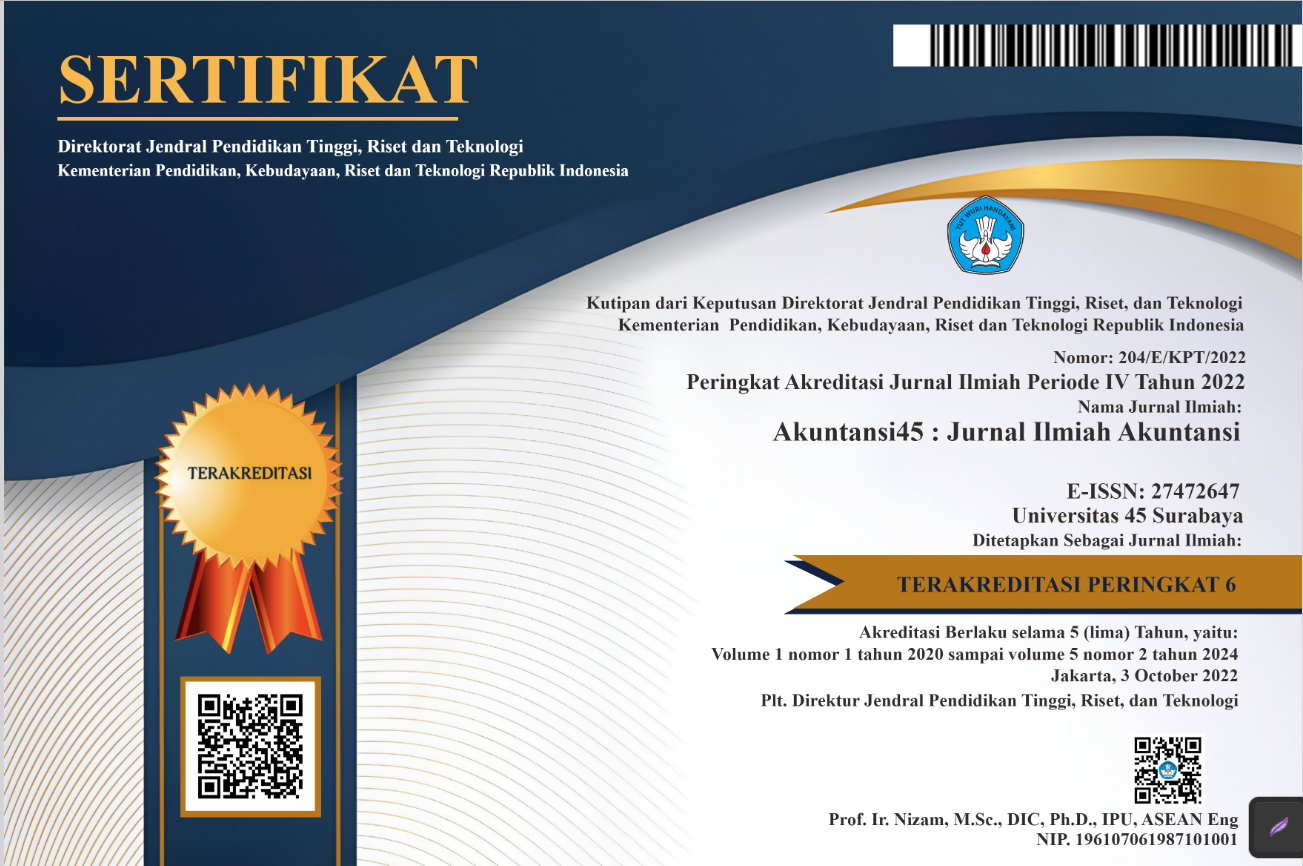Pengaruh Soft Skill dan Hard Skill pada Mahasiswa Tingkat Akhir Program Studi Akuntansi Terhadap Kesiapan Kerja Studi Kasus pada Generasi Z di Kota Denpasar
DOI:
https://doi.org/10.30640/akuntansi45.v5i2.3349Keywords:
soft-skills, hard-skills, workAbstract
This research purposes is as a tool for analyze the influence both of soft skills and hard skills on work alertness, especially in the generation Z who are the successors of the nation. This research used explanatory methods and quantitative approaches. The samples that used for this research were 36 Gen-Z samples. The technique used for data collection for this research was from survey questions using the Likert Scale's method. The sampling method used probability with a measurement technique using simple random sampling. The final result of this research is that in path analysis it can be recapitulate that Soft Skills (X1) have a positive impact and significant effect on Work Alertness (Y) with a greater t-value. from the t-table (4.082 > 2.011) and level of significant (0.000 < 0.05). Meanwhile, Hard Skill (X2) have a positive impact and significant effect on Work Alertness (Y) with the t-calculated and the t-table value, where the t-calculated have more value than the t-table value (3.082 > 2.011) and level of significant is (0.001 < 0.05).
References
Azim, S., Gale, A., Lawlor‐Wright, T., Kirkham, R., Khan, A., & Alam, M. (2010). The importance of soft skills in complex projects. International Journal of Managing Projects in Business, 3(3), 387–401.
Borrego, G., Morán, A. L., Palacio, R. R., Vizcaíno, A., & García, F. O. (2019). Towards a reduction in architectural knowledge vaporization during agile global software development. Information and Software Technology, 112, 68–82. https://doi.org/https://doi.org/10.1016/j.infsof.2019.04.008
Caballero, C. L., Walker, A., & Fuller-Tyszkiewicz, M. (2011). The Work Readiness Scale (WRS): Developing a measure to assess work readiness in college graduates. Journal of Teaching and Learning for Graduate Employability, 2(1), 41–54.
Cavanagh, J., Burston, M., Southcombe, A., & Bartram, T. (2015). Contributing to a graduate-centred understanding of work readiness: An exploratory study of Australian undergraduate students’ perceptions of their employability. The International Journal of Management Education, 13(3), 278–288.
Cimatti, B. (2016). DEFINITION , DEVELOPMENT , ASSESSMENT OF SOFT SKILLS AND THEIR ROLE FOR THE QUALITY OF. 10(1), 97–130.
Deswarta, Mardianty, D., & Bowo. (2023). Pengaruh soft skill, hard skill dan motivasi kerja terhadap kesiapan kerja mahasiswa fakultas ekonomi dan bisnis universitas islam riau di masa endemi covid-19. Management Studies and Entrepreneurship Journal, 4(1), 364–372. http://journal.yrpipku.com/index.php/msej
Devita Putri, A. (2024). Hard Skill, Soft Skill dan Efikasi Diri Terhadap Kesiapan Kerja Mahasiswa Tingkat Akhir FEB Perguruan Tinggi di Kota Bandar Lampung. Jurnal Administrasi Bisnis (JAB, 14(1), 20–32.
Dilna, S. (2018). Employers’ Assessment of Graduate Students’ Job Performances in the Work Places at Central Mindanao, Philippines. Proceedings of the International Conference on Responsive Education & Socio-Economic Transformation (ICRESET).
Fahimirad, M., Nair, P. K., & Kotamjani, S. S. (2019). Integration and Development of Employability Skills into Malaysian Higher Education Context : Review of the Literature. 8(6), 26–35. https://doi.org/10.5430/ijhe.v8n6p26
Fröhlich, D., Beausaert, S. A. J., & Segers, M. S. R. (2015). Learning to stay employable: The role of employees’ feedback seeking network and the dangers of homophily. XXXV Sunbelt Conference of the International Network for Social Network Analysis (INSNA). Brighton, UK.
Gale, A. J., Duffey, M. A., Park–Gates, S., & Peek, P. F. (2017). Soft Skills versus Hard Skills: Practitioners’ Perspectives on Interior Design Interns. Journal of Interior Design, 42(4), 45–64. https://doi.org/10.1111/joid.12105
Gruzdev, M. V, Kuznetsova, I. V, Kazakova, E. I., Federation, R., Federation, R., & Federation, R. (2018). Copyright © 201 8 by Academic Publishing House Researcher s . r . o . All rights reserved . Published in the Slovak Republic European Journal of Contemporary Education WARNING ! Article Copying , reproduction , distribution , republication ( in whole or i. 7(4), 690–698. https://doi.org/10.13187/ejced.2018.4.690
Haamann, T., & Basten, D. (2019). The role of information technology in bridging the knowing-doing gap: an exploratory case study on knowledge application. Journal of Knowledge Management, 23(4), 705–741.
Hart, P. D. (2008). How should colleges assess and improve student learning? Employers’ views on the accountability challenge. A survey of employers conducted on behalf of: The Association of American Colleges and Universities. Washington, DC: Peter D. Hart Research Associat. Inc., Washington, DC.
Harvey, L. (2001). Defining and measuring employability. Quality in Higher Education, 7(2), 97–109.
Jackson, D. (2019). Student perceptions of the development of work readiness in Australian undergraduate programs. Journal of College Student Development, 60(2), 219–239.
Key, T. M., Czaplewski, A. J., & Ferguson, J. M. (2019). Preparing workplace-ready students with digital marketing skills. Marketing Education Review, 29(2), 131–135.
Khairudin, & I’fa, P. I. (2023). Pengaruh Soft Skill Terhadap Kesiapan Kerja Mahasiswa Universitas Bandar Lampung. Jurnal EMT KITA, 7(3), 659–664. https://doi.org/10.35870/emt.v7i3.1203
Lie, N. L. C., & Darmasetiawan, N. K. (2018). Pengruh Soft Skill terhadap Kesiapan Kerja Menghadapi Masyarakat Ekonomi Asean pada Mahasiswa S1 Fakultas Bisnis dan Ekonomika. Calyptra: Jurnal Ilmiah Mahasiswa Universitas Surabaya, 6(2), 1496–1514.
Lombardi, R. (2019). Knowledge transfer and organizational performance and business process: past, present and future researches. Business Process Management Journal, 25(1), 2–9.
Mahmudah, L. (2016). Improving the Hard Skills and Soft Skills of Madrasah Teachers for Dealing ASEAN Economic Community (Aec). Addin, 10(2), 341–364. https://doi.org/10.21043/addin.v10i2.1308
Manullang, D. T., Sinaga, D., Tampubolon, S., & Sinaga, A. A. (2023). Pengaruh Soft Skill Siswa Terhadap Kesiapan Kerja Siswa SMK Negeri 1 Sidikalang Tahun Ajaran 2022/2023. INNOVATIVE: Journal Of Social Science Research, 3(2), 6160–6174.
Maulidiyah, R., & Ubaidillah, H. (2024). The influence of soft skills, hard skills and motivation on student work readiness as the z generation to face the digital era. 7, 4875–4889.
Mawardi, M. (2019). Rambu-rambu Penyusunan Skala Sikap Model Likert untuk Mengukur Sikap Siswa. Scholaria: Jurnal Pendidikan Dan Kebudayaan, 9(3), 292–304. https://doi.org/10.24246/j.js.2019.v9.i3.p292-304
Moore, T., & Morton, J. (2017). The myth of job readiness? Written communication, employability, and the ‘skills gap’in higher education. Studies in Higher Education, 42(3), 591–609.
Noah, J. B., & Aziz, A. B. A. (2020). A Systematic review on soft skills development among university graduates. 6(1), 53–68.
Pachauri, D., & Yadav, A. (2014). Importance of soft skills in teacher education programme. International Journal of Educational Research and Technology, 5(1), 22–25.
Raihan, M., & Nengsih, M. K. (2024). Influence Of Soft Skill And Hard Skill On Employment Preparedness ( Gen Z And Gen M Comparison Study ) In Bengkulu City Pengaruh Soft Skill Dan Hard Skill Terhadap Kesiapan Kerja ( Studi Komparasi Gen Z Dan Gen M ) Di Kota Bengkulu. 4(1), 19–28.
Rainsbury, E., Hodges, D. L., Burchell, N., & Lay, M. C. (2002). Ranking workplace competencies: Student and graduate perceptions.
Sinarwati. (2014). Pengaruh Soft Skill dan Hard Skill Terhadap Kienerja Pegawai. Pengaruh Soft Skill Dan Hard Skill Terhadap Kinerja Pegawai, 1(Mei), 19–28.
Spiller, L., & Tuten, T. (2015). Integrating metrics across the marketing curriculum: The digital and social media opportunity. Journal of Marketing Education, 37(2), 114–126.
Tang, K. N. (2019). Beyond Employability : Embedding Soft Skills in Higher Education. 18(2), 1–9.
Tsaoussi, A. I. (2020). Using soft skills courses to inspire law teachers: a new methodology for a more humanistic legal education. The Law Teacher, 54(1), 1–30. https://doi.org/10.1080/03069400.2018.1563396
Widoyoko, E. P. (2009). Evaluasi program pembelajaran. Yogyakarta: Pustaka Pelajar, 238.
Downloads
Published
How to Cite
Issue
Section
License
Copyright (c) 2024 AKUNTANSI 45

This work is licensed under a Creative Commons Attribution-ShareAlike 4.0 International License.









